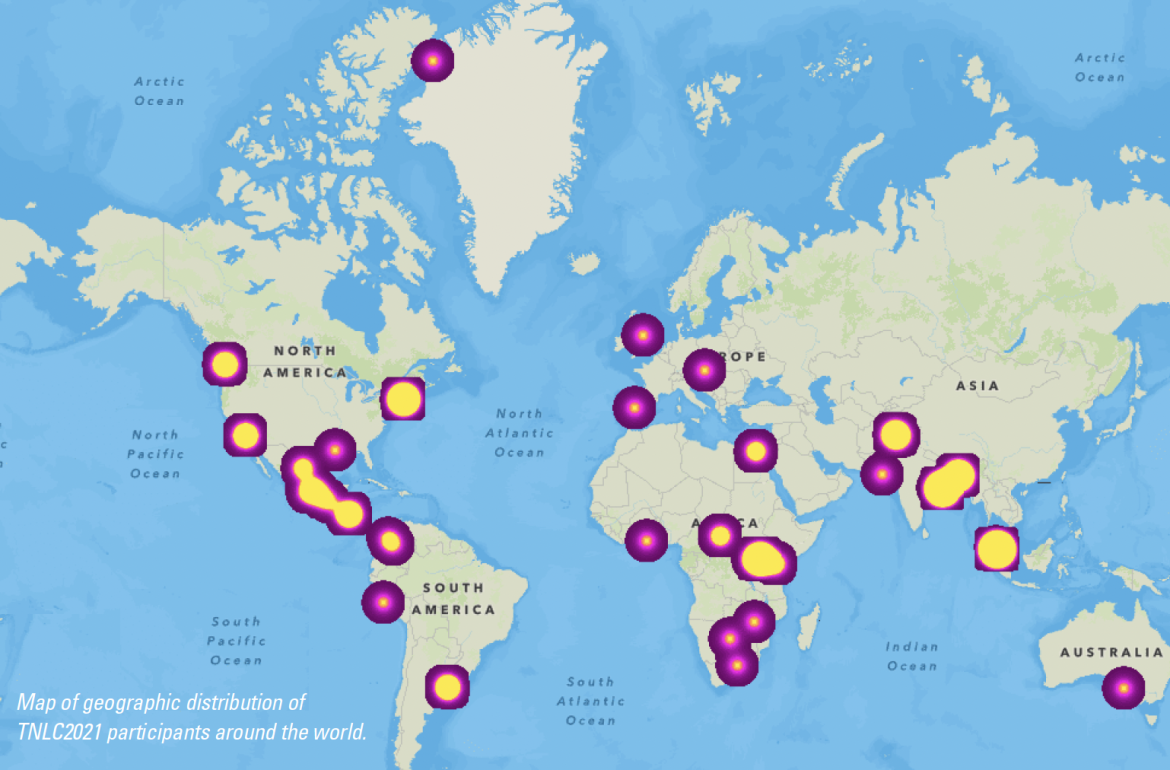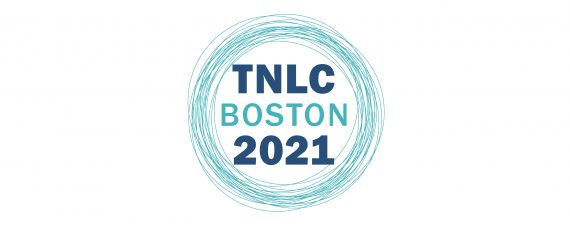TNLC2021: Boston
Global Institutions, Local Impact:
Power and Responsibility of Engaged Universities
- How are global challenges affecting local communities?
- How are engaged universities working effectively with local leaders to address these challenges?
- What are the roles and responsibilities of the engaged university in solving global challenges?
The Talloires Network Leaders Conference 2021 (TNLC2021) addressed these questions and more, exploring the theme of “Global Institutions, Local Impact.” The Talloires Network Leaders Conference (TNLC2021) took place at the virtual campuses of Tufts University and Harvard University on 30 September – 3 October 2021, as well as in international hubs across the world. TNLC2021 reached more than 1,400 university leaders, faculty, staff, students, and community partners from 53 countries worldwide. We increased access and participation by providing 18 Grants for Engaged Universities in 14 countries to host safe local gatherings, conducting all 24 conference sessions in English and Spanish, recording sessions to accommodate time zone differences, featuring the movement-building event in University World News, and shipping electronic devices to student participants around the world. Together we produced and signed the 2021 Declaration, a statement of our shared values and vision for higher education. We also documented key takeaways in the TNLC2021 Report and a Short Film to document the conference.
Find all of our TNLC2021 resources such as agenda, speakers, reflections, reports, and more below!
Tufts University’s Tisch College of Civic Life and the Institute of Politics at Harvard Kennedy School were proud to jointly host TNLC2021, a global gathering of universities focused on civic engagement and leadership. The Talloires Network is an international association of over 424 institutions in 84 countries committed to strengthening the civic roles and social responsibilities of higher education. This influential gathering of higher education leaders from all regions of the world has charted the next stage of the growing university civic engagement movement.
Together, we explored four vital sub-themes and build support around these opportunities:
- Critical Reflections on the Role of Engaged Universities and Climate Justice: Climate change is an urgent global problem affecting societies in myriad profound ways. What are the roles and responsibilities of universities in addressing the causes and consequences of climate change, and how can engaged universities work together to enhance impact? Participants will critically reflect on their experiences while addressing the causes of climate change at global and local levels, and how they are adapting to and addressing its social and economic impacts. Participants will also examine the obstacles and opportunities associated with university efforts to implement the 2030 Sustainable Development Goals. Particular attention will be paid to the implications of adopting a “climate justice” frame, which relates the effects of climate change to concepts of justice, equality, human rights, and collective rights.
- Power and Responsibility of Engaged Universities to Address Conflict and Inequality: How are universities responding to social, economic, cultural and other inequalities in society and their effects on campus? How are universities fostering constructive engagement and deliberation in a global context of increasing polarization, social conflict (violent and non-violent) and decreasing civility? In addition to sharing experience and research on effective approaches to addressing these challenges, participants will exchange ideas and strategies to address inequality and promote greater justice, inclusion and social cohesion, both on campus and in the communities of which they are a part.
- Innovative Practices of Engaged Universities Around the World: How are universities engaging with new global challenges—from climate and conflict to urbanization, public health and migration and displacement? How are engaged universities collaborating with new or nontraditional partners? What innovative approaches and initiatives for engagement are contributing to more equal and inclusive societies? In these sessions, university and community partners will share experiences, successes, challenges and lessons from a variety of perspectives, with particular attention on reciprocal partnerships that incorporate gender equality, diversity and inclusion into their mission and activities.
- Classifications, Frameworks, and Transformative Communities of Practice for Engaged Universities: How are universities collaborating to build shared frameworks for institutionalizing, classifying and assessing university-community engagement that center communities? TN members and conference participants will share experiences of institutionalizing and assessing community engagement. Participants will reflect on existing communities of practice and share lessons learned and good practices from different regions in the world. Session participants will also discuss the tensions between comprehensive assessment-based frameworks and metric driven rankings. Particular consideration will be given to varied national and local contexts and colonial histories.
Conference Design and Participation:
We designed the conference to maximize involvement, direct interaction, learning, and solidarity building among conference participants. We aimed to create a conference experience that supported participant deliberation and strategic planning for future action, implementing not only plenary sessions and a keynote, but interactive breakout sessions and networking events. Consideration was given to follow-up and potential expansion of the themes and values articulated in the Veracruz Declaration ratified in 2017. We provided simultaneous Spanish and English interpretation for all 24 sessions as well as closed captioning to ensure accessibility. We also provided recordings of the conference to accommodate those in varying time zones.

We acknowledge that map bias is unavoidable and do not intend to diminish the significance of southern-hemisphere continents.
